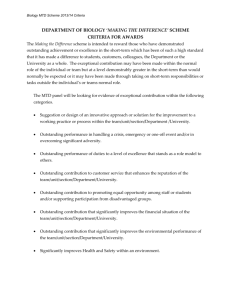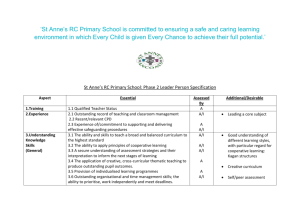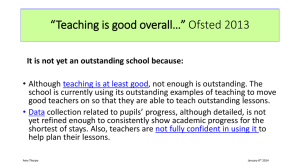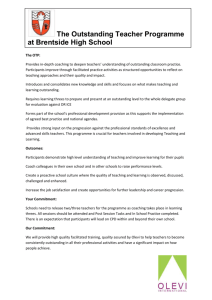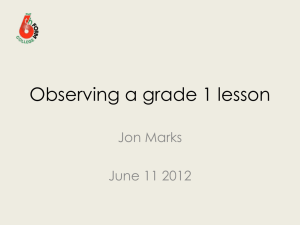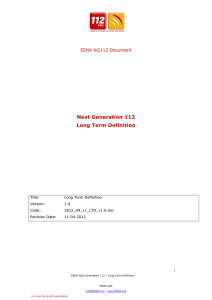MEDIA ADVISORY
advertisement
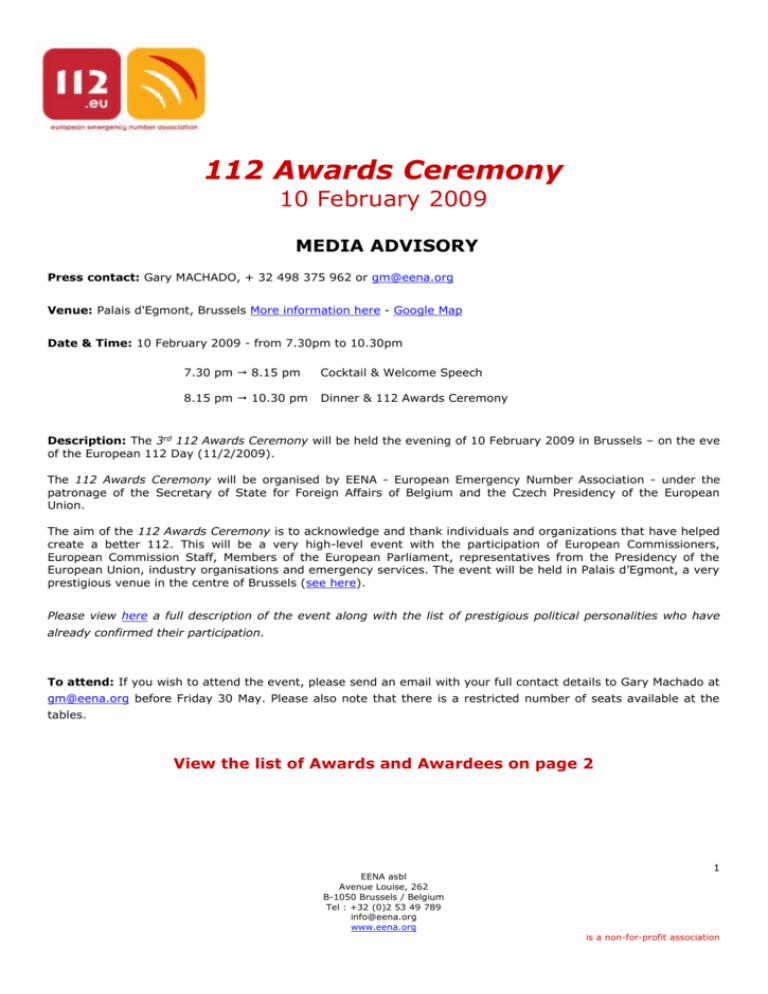
112 Awards Ceremony 10 February 2009 MEDIA ADVISORY Press contact: Gary MACHADO, + 32 498 375 962 or gm@eena.org Venue: Palais d'Egmont, Brussels More information here - Google Map Date & Time: 10 February 2009 - from 7.30pm to 10.30pm 7.30 pm 8.15 pm Cocktail & Welcome Speech 8.15 pm 10.30 pm Dinner & 112 Awards Ceremony Description: The 3rd 112 Awards Ceremony will be held the evening of 10 February 2009 in Brussels – on the eve of the European 112 Day (11/2/2009). The 112 Awards Ceremony will be organised by EENA - European Emergency Number Association - under the patronage of the Secretary of State for Foreign Affairs of Belgium and the Czech Presidency of the European Union. The aim of the 112 Awards Ceremony is to acknowledge and thank individuals and organizations that have helped create a better 112. This will be a very high-level event with the participation of European Commissioners, European Commission Staff, Members of the European Parliament, representatives from the Presidency of the European Union, industry organisations and emergency services. The event will be held in Palais d’Egmont, a very prestigious venue in the centre of Brussels (see here). Please view here a full description of the event along with the list of prestigious political personalities who have already confirmed their participation. To attend: If you wish to attend the event, please send an email with your full contact details to Gary Machado at gm@eena.org before Friday 30 May. Please also note that there is a restricted number of seats available at the tables. View the list of Awards and Awardees on page 2 EENA asbl Avenue Louise, 262 B-1050 Brussels / Belgium Tel : +32 (0)2 53 49 789 info@eena.org www.eena.org 1 is a non-for-profit association EMBARGOED UNTIL 10 February This list of awardees should not be revealed before 10 February and the official presentation of the Awardees to the media at the event EENA Advisory Board & the 112 ESSN Members are delighted to announce the selected Awardees: Outstanding Vision for 112 - Hannes Tschofenig, IETF-ECRIT Contact: Hannes Tschofenig, hannes.tschofenig@nsn.com & +358504871445 Outstanding Contribution to Public Warning - Ministry of Interior, The Netherlands Contact: Willy Steenbakkers, Willy.Steenbakkers@minbzk.nl & +31704265630 Outstanding in-vehicle emergency call initiative (eCall) - ADAC, Germany Contact: Katrin Muellenbach-Schlimme, Katrin.muellenbach-schlimme@adac.de Outstanding Accessible 112 Initiative - Administration for Civil Protection and Disaster Relief, Slovenia Contact: Katja Banovec Juros, Katja.Banovec.Juros@urszr.si & +38614711855 Outstanding Emergency Service Initiative - 112 Murcia, Spain Contact: Luis Gestoso de Miguel, luis.gestoso@carm.es & +34618680341 Outstanding Education on 112 - Special Telecommunications Service, Romania Contact: Adrian Fulea, adrian.fulea@stsnet.ro & +40740778807 Outstanding Citizens’ Initiative - Ute and Siegfried Steiger, Germany Contact: Franca Buzza, F.Buzza@steiger-service.de & +49-172-7310121 Outstanding Political Initiative – Ms. Vergnaud & M. Busoi, Members of the European Parliament Contact: Office of Bernadette Vergnaud, bernadette.vergnaud@europarl.europa.eu & +3222845210 Office of Cristian-Silviu Busoi, cristiansilviu.busoi@europarl.europa.eu & +3222845732 Outstanding National initiative on 112 - Fire and Rescue Service, Czech Republic Contact: Jan Urbanek, Jan.Urbanek@grh.izscr.cz & +420724979459 Outstanding First Responder & First Aid - M. Andersen & M. Knudsen, Falck & Joan M. Hansen, Denmark Contact: Marc Alex Ib Uhrenholt, maiu@falck.dk & +4529206554 Outstanding 112 Call Centre - 112 Madrid, Spain Contact: Alejandro Martínez Garcia, amartinez@madrid112.es & +34917089132 Read the Awardees stories below on page 3 to 8 EENA asbl Avenue Louise, 262 B-1050 Brussels / Belgium Tel : +32 (0)2 53 49 789 info@eena.org www.eena.org 2 is a non-for-profit association Outstanding Vision for 112 Coordination of Standardization Work on Emergency Services, IETF-ECRIT In November 2004 Jon Peterson and Hannes Tschofenig organized a Birds of a Feather meeting to convince participants of the Internet Engineering Task Force (IETF) to work on specifications for emergency calling over the Internet. A few months later the IETF ECRIT working group (see http://www.ietf.org/html.charters/ecritcharter.html) was created and the technical work began with Marc Linsner and Hannes as the working group chairs. Very soon afterwards it became clear that there are many organizations trying to define their own architecture and protocols for the same purpose. Facing the danger of contradicting and duplicated work the idea for the emergency services coordination workshops (see http://www.emergency-services-coordination.info) was born with Hannes as one of the members of the Program Committee. Workshop planning has always been challenging with the attempt to gather not only standardization organizations but also other stakeholders together. Since the feedback from the participants was always very positive we recently held the 5 th workshop (in Vienna). These workshops (and other coordination activities with larger organizations, such as IEEE, 3GPP and TISPAN) have helped the standardization community to get a better understanding of the needs of various stakeholders and to develop more robust specifications. This is, however, not the time to stop coordinating as standardization and deployment activities are still ongoing. Outstanding Contribution to Public Warning EU project: Cell Broadcast for Public Warning The ‘Cell Broadcast for Public Warning – sharing knowledge and experiences and identification and standardisation of (technical) requirements’ project will be carried out from 1 September 2008 until 31 December 2009. Cell Broadcast is a technology used for communicating with the general public in high-risk and crisis situations. After a successful tender the system will be implemented in the Netherlands in the period 2009 and going live in the beginning of 2010. An important part of the project concerns the sharing of Cell Broadcast knowledge with other (EU) countries to gain more in-depth knowledge on the subject. An other objective is to provide direction for the mobile (standardization) industry and the European Commission in order to offer our citizens a seamless Cell Broadcast service for warning and informing the public in times of crisis at both national and international level. As a subproject within this project, events will be organized together with 6 EU countries. These 6 countries (Germany, Hungary, the Netherlands, Poland, the United Kingdom and Sweden) are the countries which jointly submitted the Call for Proposals of the European Commission in May 2008 (Prevention, Preparedness and Consequence Management of Terrorism and Other Security Related Risks programme) and are referred to as the ‘partner countries’. The countries which participate in the events, but do not belong to this group of 6 organizing countries are referred to as ‘participating countries’ (for instance, Belgium, France, Finland, Norway, Estonia and Austria). EENA asbl Avenue Louise, 262 B-1050 Brussels / Belgium Tel : +32 (0)2 53 49 789 info@eena.org www.eena.org 3 is a non-for-profit association Outstanding in-vehicle emergency calling initiative (eCall) German automobile club ADAC, Germany As eCall is known to improve road safety and enhance the rescue services in the Member States, ADAC signed the Memorandum of Understanding of the eCall Initiative as early as 2004 to express its willingness to actively support the deployment of eCall across Europe. Since then, in coordination with ARC Europe, the leading European network of automobile clubs, ADAC has been undertaking various measures to support and promote the implementation of eCall. With its competence as an established consumer protection organization and its experience with GPS-based services for road users, ADAC has made substantial contributions to expert discussions and papers both at high and at project level. In spring 2007, ADAC and the FIA automobile clubs published articles in their club magazines to raise the road users’ awareness of eCall and its potential benefits. Also in 2007, ADAC in cooperation with its ARC Europe partner clubs ÖAMTC, Austria, and ACI Global, Italy, as well as with the industrial partners, Airbiquity, Continental, Opel and T-Mobile, conducted a cross-border eCall Feasibility Trial to look into the feasibility of the pan-European in-vehicle eCall service as recommended by the eCall Driving Group and adopted by the European Parliament. This eCall Feasibility Trial has proven, that a panEuropean in-vehicle eCall service is viable. The trial has been recognized and appreciated both at national and European level. Outstanding Accessible 112 Initiative (112 calls made by people with disability) Slovene 112-center introduces solution for people with hearing and other disabilities, Slovenia The »WAP 112 call« is a solution which was introduced in the 112 Centre Ljubljana, the capital of the Republic of Slovenia. Through this centre all WAP 112 calls from the territory of Slovenia are received. This solution is mainly meant to enable 112 calls to people with hearing disabilities. The application is available on the 112 wap page wap.sos112.si in Slovene as well as in English language. From the 1st February 2009 the application will be upgraded with an automatic localization of the caller from Slovene main GSM operator – Mobitel. Later, also the other GSM providers will follow. A short description of the functionality: Step 1: the caller enters his/her GSM number, name and address Step 2: the caller has to choose between the following services from the menu: medical help, firemen, police or other help Step 3: the system asks the caller to confirm his/her choice, like for example: »You’ve chosen firemen assistance«. If confirmed, the system leads you to Step 4, if not, returns back to Step 2. Step 4: after confirming all previously entered data: GSM number, name, address and the type of assistance needed the system shows all the data on one screen and asks for the final confirmation with the following warning »I confirm the correctness of the data and want to trigger the SOS 112 call”. Step 5: the 112 operator accepts the request for assistance The »WAP 112 call« is a solution which is constantly upgraded with new versions and represents the first step towards multimedia support of 112 calls for people with disabilities in Slovenia. Video calls and other functionalities are planned in the future. The upgrading of the user interface is done in the context of regular “brainstorming” with the representations of institutions that are in charge of people with different kind of disabilities. Outstanding Emergency Service Initiative EENA asbl Avenue Louise, 262 B-1050 Brussels / Belgium Tel : +32 (0)2 53 49 789 info@eena.org www.eena.org 4 is a non-for-profit association 112 Video Calls in Murcia, Spain 112 Region of Murcia was developed thanks to the efforts of the Government of M. Ramon Luis Valcarcel, his President, who invested big amounts of every year budgets to have this outstanding emergency service. After an accident in Murcia, Spain, where the victim did not survived because of the lack of information provided by the called to the 112 centre in Murcia Francisco Rojo (Director of New technologies of the emergencies center of Murcia) and the new technologies team of the112 of Murcia invented a pioneer system, where today the 112 centre in Murcia can identify the cell phone that is calling, and if it’s a 3G cell phone and under 3G reception, they can remotely make a take over of the phone and activate the cell phones speaker, microphone and Video-camera. Thanks to this idea, the 112 emergency centre in Murcia can get images and video LIVE from the emergency area, and since an image speaks more than thousand words – they can prevent future victims due to the lack of information provided to the emergency centre. Outstanding education on 112 National campaign for informing-educating the pupils on using 112 emergency number, Romania The objective of the educational actions carried out among pupils is to inform children and young people about the correct use of 112, only in case of emergencies. The Special Telecommunications Service (STS) representatives met the leaders of the county school inspectorates, the schools and high schools directors, persons responsible for the projects in education, whose support was asked for, as part of the efforts to limit the false calls to 112 collaboration protocols were concluded therewith. To aid the teaching staff, the presentation of 112 System, system function, the way a case is processed, examples emergencies, how to be prepared for an emergency situation, power point presentations, quizzes for interactive contests for pupils, participating diplomas for teachers and pupils, educational and informational flyers, statistics regarding 112 calls, press releases) were posted on school inspectorates’ websites and on www.112.ro website. STS produced audio and video spots and commercials containing educational-informational messages, projected on plasma screens in public places and within police stations or transmitted to local and central radio and television stations. Altogether with the Center for Health Policies and Services, we succeeded in printing flyers, posters and other informative materials distributed in hospitals, railway and underground stations, schools etc. Press releases about the events of this campaign were also transmitted to the mass-media: newspapers, local and central radio and television stations, press agencies. STS received the award for “The best communication campaign” in a national contest with all the mobile telecom operators. On the 11/2 2008, the first European 112 Day, the National Unique System for Emergency Calls organized countrywide actions where pupils have been given explanations about the 112 System, while visiting 112 PSAP centers, as well as recommendations for the correct use of 112 emergency EENA asbl Avenue Louise, 262 B-1050 Brussels / Belgium Tel : +32 (0)2 53 49 789 info@eena.org www.eena.org 5 is a non-for-profit association Outstanding Citizens’ Initiative Ute and Siegfried Steiger The non-profit organisation Björn Steiger Stiftung was founded after the death of the eight-year-old Björn Steiger on Mai 3rd, 1969. The boy got struck by a car and had to wait over an hour until the ambulance arrived. He died on the way to the hospital as a result of a shock. With the goal to improve emergency services in order to save lives his parents, Ute and Siegfried Steiger, founded the foundation. To fulfil its mission the Björn Steiger Stiftung has for 40 years initiated, financed and supported different emergency programmes with an outstanding outcome. One of the first milestones set by the Björn Steiger Stiftung was the introduction of the common SOS-numbers 112/110 in Germany in the beginning of the 1970´s, which now is the common SOS-number in the EU (112). Radio communication, emergency road telephones, baby ambulances as well as the German Air Rescue, which is the biggest air rescue organisation in Europe, are other programmes initiated by the Björn Steiger Foundation. In 2006 another milestone was set by the decision to launch the LifeService platform in all German PSAPs, which enables caller location from mobile phones in case of emergency. In 2007 the same system was identified as a suitable eCall carrier and since then the organization has played an important role in the establishment of eCall in Europe. There is an ongoing process to improve the LifeService platform and integrate additional services, which will improve the daily work in a PSAP. One example of such an improvement is the emergency records, which were integrated in the platform in 2008. The Björn Steiger Stiftung is also engaged in the work to reduce sudden cardiac death through actively promote AEDs and train citizen in first aid. Such a training program will in 2009 be addressed to German pupils in the 7th grade. Summing-up, the initiative of Ute and Siegfried Steiger to found the Björn Steiger Stiftung is one example of how a tragic family fate can be turned into a positive driver - and change the life of many people thanks to improved emergency services. Outstanding Political Initiative MEPs Bernadette Vergnaud and Cristian Busoi MEPs Vergnaud and Busoi will be awarded for their contributions to emergency communications during the revision of the Universal Service Directive. As a result, the revision of the European Parliament proposes the following: Member States should condone more efforts for informing and educating the public on the use of 112 The 112 should be made accessible from the entire EU territory Member States will have to ensure the implementation of caller-location Access to emergency services through the 112 may be blocked in case of repeated misuse by the user The 112 should be more accessible to people with disabilities EENA asbl Avenue Louise, 262 B-1050 Brussels / Belgium Tel : +32 (0)2 53 49 789 info@eena.org www.eena.org 6 is a non-for-profit association Outstanding National Initiative on 112 112 in Czech Republic Fire and Rescue Service of the Czech Republic is ordained to operate PSAPs for 112. Introduction of those centers led to eminent asset in modernizing of emergency call dispatching process in the Czech Republic. PSAP centers in the Czech Republic are built on the complex technology system to receive calls to single European emergency call number 112 and 150, which is unified and globally engaged on all centers in the Czech Republic. The technology integrates current progressive functionalities, including fixed telephone terminal identification (number and address), phone operator identification, cellular phone localization, IMEI identification, unified GIS implementation, mutual technology backup, self-sustaining IP phone connection and language support. The solution also introduces data communication with operational centers of fundamental branches of Integrated Rescue System in the Czech Republic (Fire and Rescue Service, Police, Ambulance), whereas PSAP call centers notify those operational centers about emergency situation by sending structured data document, which is onward processed by application software of these centers. As a pilot this technology was prepared to process incoming eCall events by the update module to present system. Cross interconnection between all centers ensures, that any call is delivered to dispensable call taker in no time, regardless to the locality, to guarantee that the citizen will always get beneficent assistance (call set-up time 0.75 sec, call response 3.5 sec). Localization of mobile users uses push method, thus the information is usable at the beginning of the call. The development of the system is still in progress to achieve top efficiency. Outstanding First Responder & First Aid School girl saves best friend from gas explosion In June last year, Joan Hansen and her friend Laura went camping with the rest of the children from grade 7th. While cooking, a heavy gas explosion appears from one of their jets, which causes it to go on fire. The flames hit Laura's jacket and her face, as well as her chest and legs, get seriously burnt. Joan, who’s standing next to Laura, reacts very quickly. She gets Laura to lie down and rolls her over, in an attempt to put the fire out. A teacher rushes to the scene and calls 112 for help. The 112 contacts Falck and asks for an ambulance. While Joan and the teacher await the ambulance, they keep Laura cold under the shower. Because of tide the rescuers are not sure that they would make it to the main land. Instead they take the girl to a nearby playing field, with enough room for a helicopter to land. As the helicopter arrives it is decided that Laura due to her injuries needs to be taken to the University Hospital of Copenhagen 300 km away, where a team of specialists awaits her. Joan has been there for Laura all the way through her rehabilitation process. The doctors say that the main reason why Laura is able to make a full recovery without any permanent injuries, is because Joan reacted so quickly. This statement was also confirmed by the rescuers from the ambulance. EENA asbl Avenue Louise, 262 B-1050 Brussels / Belgium Tel : +32 (0)2 53 49 789 info@eena.org www.eena.org 7 is a non-for-profit association Outstanding 112 Call Center 112 Madrid, Spain 112 has more than 10 years experience as single Emergency Number in Madrid and Madrid 112 Centre handles 90% of the emergency calls received in the region. A great effort to make population aware of 112 as the only Emergencies Number has been made during the last years in Madrid and Spain and Madrid 112 Centre also collaborates receiving, teaching and training children about the significance of 112 centres. Madrid 112 stands out for gathering in one centre all the stakeholders involved in the emergency services, with a great effort to integrate in one platform their communications systems, including Civil Protection, Emergency Health Care Mobile Services SUMMA and SAMUR, Madrid City Council Fire Brigade, Regional Fire Brigade, Forestal Brigade, Madrid Municipal Police, local Police from other towns in Madrid Region, Spanish Civil Guard, Spanish National Police, Red Cross, and more. Professionalism and efficiency in Madrid 112 Emergency Services have overcome important tests, like the 2004 March 11th terrorist attacks, the Windsor Building fire and the Barajas airplane crash last August. As time goes by, Madrid 112 Centre has become a World reference to evaluate every kind of situation related to Emergency Services. A sign of this international leadership are the almost 200 visits received at its headquarters, which confirm its constant eagerness to innovate and its determination to improve the emergencies management. Some of the most important initiatives in this sense are the location of mobile calls, the accessibility for people with disabilities (like deaf people), the tool for massive warning broadcast or having call-takers speaking more languages than Spanish. EENA asbl Avenue Louise, 262 B-1050 Brussels / Belgium Tel : +32 (0)2 53 49 789 info@eena.org www.eena.org 8 is a non-for-profit association
